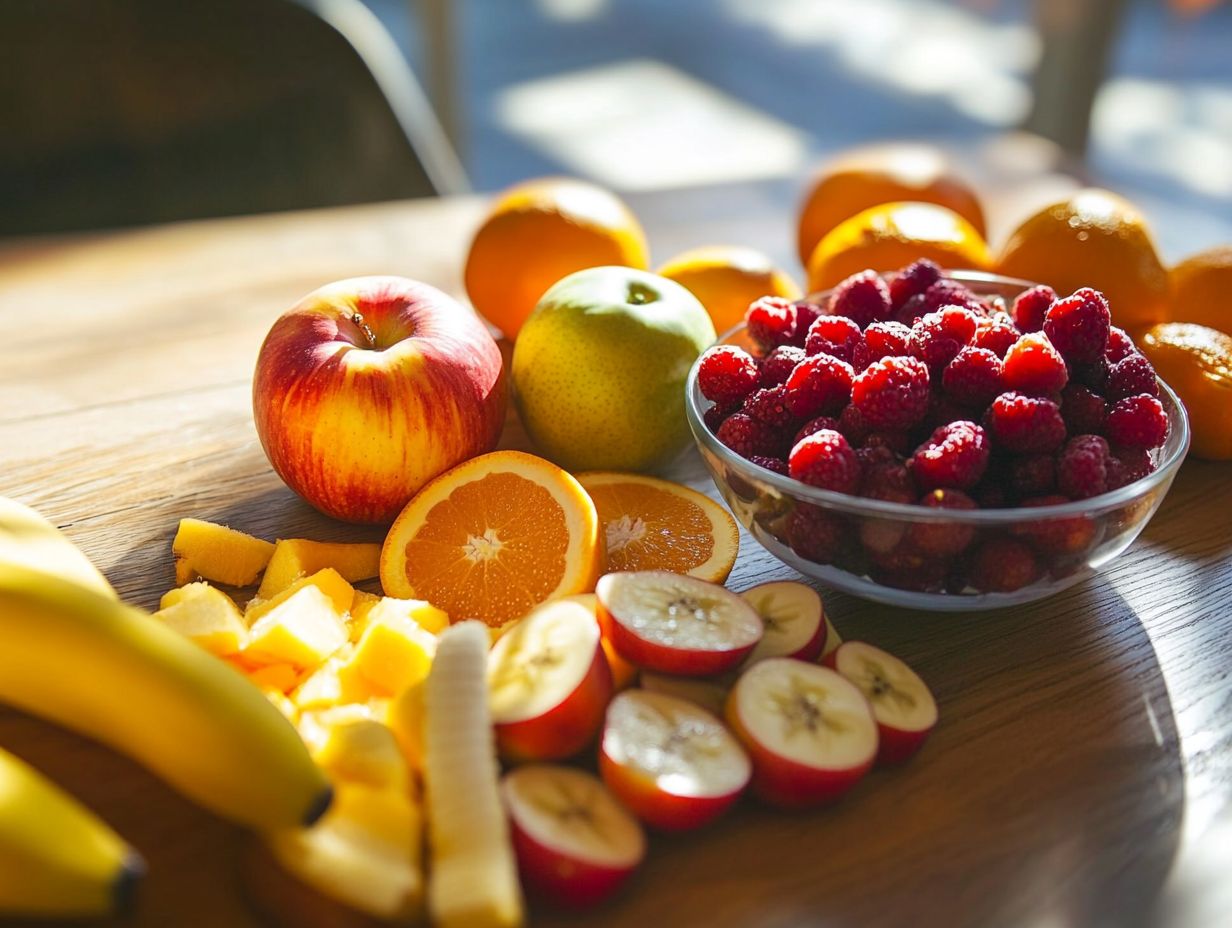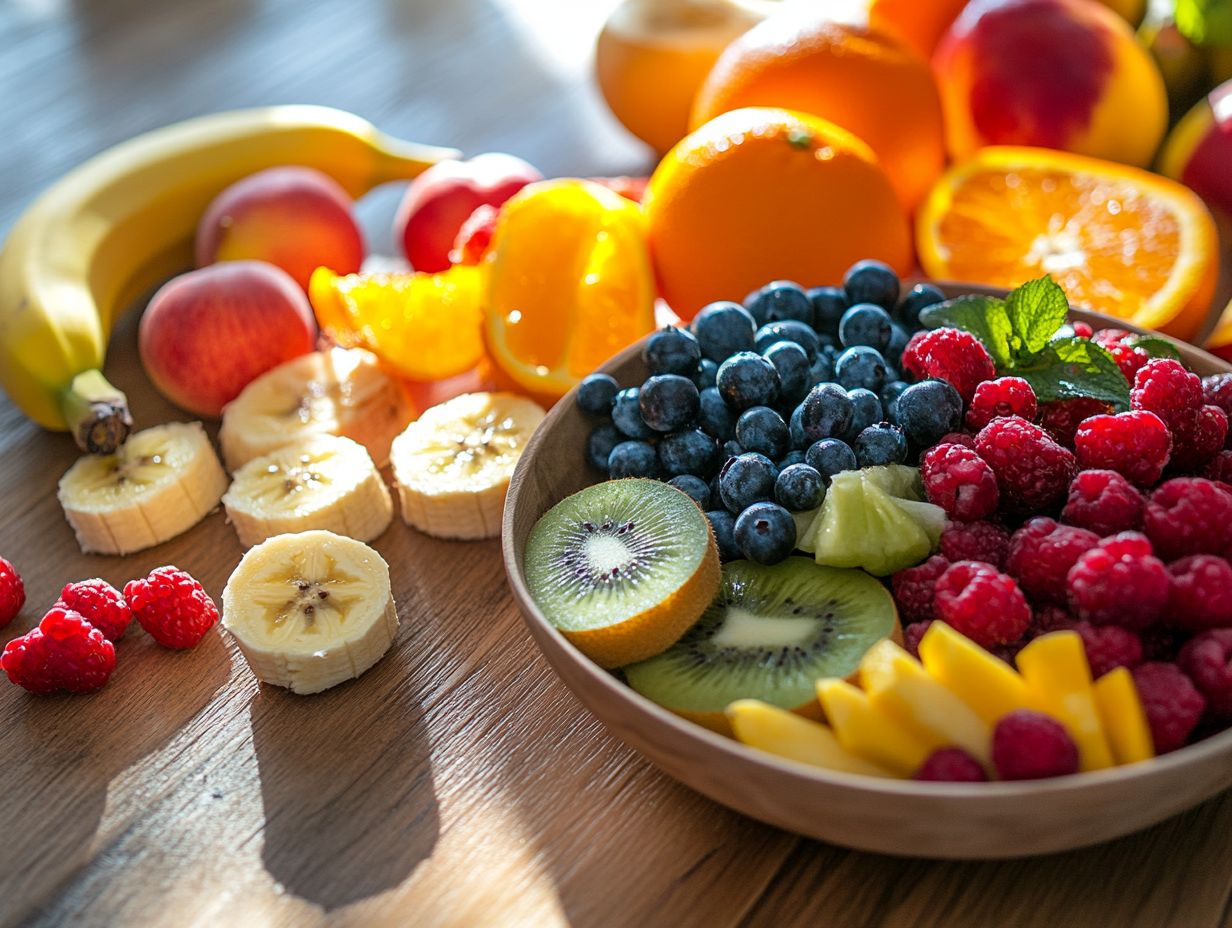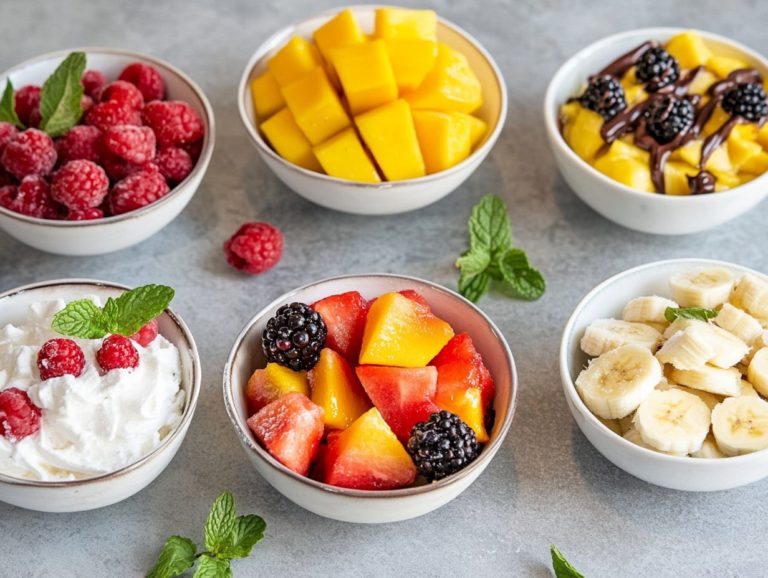The Benefits of Incorporating More Fruits
Fruits are not merely a delightful treat; they are fundamental to a vibrant and healthy lifestyle. Bursting with essential nutrients like vitamins, minerals, dietary fiber, and antioxidants, fruits play a pivotal role in enhancing your immune system, promoting better digestion, and reducing the risk of chronic diseases such as cardiovascular disease and type 2 diabetes.
This article explores the many health benefits of fruits, guides you on how many daily servings to include in your diet, and offers simple yet effective tips for adding more of these nutritious gems, along with vegetables, to your meals.
It also highlights which fruits and vegetables you should savor and which ones to enjoy in moderation. Start transforming your health today with every delicious bite!
Contents
- What Are the Health Benefits of Eating Fruits?
- The Importance of Fruits for Your Health
- How Many Servings of Fruits Should You Eat Daily?
- What Are Some Easy Ways to Incorporate More Fruits into Your Diet?
- 1. Add Fruits to Your Breakfast
- 2. Snack on Fruits Throughout the Day
- 3. Use Fruits as Toppings or Fillings
- Try Different Fruits for Delicious Smoothies
- Are There Any Fruits and Vegetables to Avoid or Limit?
- Frequently Asked Questions
- What are the benefits of incorporating more fruits and vegetables into my diet?
- How can incorporating more fruits and vegetables into my diet improve my digestion?
- What role do fruits and vegetables play in boosting my immunity?
- Can incorporating more fruits and vegetables into my diet help me with weight management?
- Are there any specific fruits and vegetables that offer unique benefits?
- How can I easily incorporate more fruits and vegetables into my diet?
Key Takeaways:

- Including more fruits in your diet provides essential nutrients such as vitamins, minerals, fiber, and antioxidants.
- Eating fruits can lead to numerous health benefits, including a boosted immune system, improved digestion, and a decreased risk of chronic diseases.
- Aim for at least 2-3 servings of fruits per day and incorporate them into your meals and snacks for an easy and delicious way to improve your overall health and adhere to dietary guidelines.
The Importance of Eating Fruits
Incorporating a diverse array of fruits and vegetables is essential for maintaining optimal health. These natural wonders are full of important nutrients that help combat cardiovascular disease and lower blood pressure.
Fruits are rich in dietary fiber, vitamins, and antioxidants, which play a crucial role in preventing chronic illnesses like heart disease and type 2 diabetes. They also support gastrointestinal and vision health. Increasing your fruit and vegetable intake can significantly boost your overall health.
The Dietary Guidelines for Americans suggest including a colorful selection of fruits and vegetables in your daily meals, making it easier to enjoy significant health benefits and promoting weight loss while improving nutrient absorption through their diverse plant compounds.
What Are the Nutrients Found in Fruits?
Fruits serve as a powerhouse of essential nutrients, packed with an array of vitamins, minerals, and antioxidants that enhance your overall health. These nutrients not only strengthen your immune system but also play a crucial role in reducing the risk of chronic ailments like cardiovascular disease and cancer.
By providing dietary fiber, fruits promote healthy digestion and help regulate blood sugar levels, particularly important for those at risk of type 2 diabetes. Embracing a fruit-filled diet enables you to cultivate a healthier lifestyle and may reduce cancer risk.
1. Vitamins
Vitamins are essential organic compounds that fruits offer in abundance, playing a pivotal role in many physiological functions and health benefits. Consider fruits like oranges and strawberries; they are particularly rich in vitamin C, which fortifies your immune system. Meanwhile, bananas are an excellent source of potassium, crucial for regulating blood pressure.
Fruits such as blueberries and kiwi contain vitamin E, known for its antioxidant properties that help protect your cells from damage and may lower the risk of chronic diseases like heart disease. Avocados, on the other hand, are packed with healthy fats and vitamin K, which contributes to blood clotting and bone health.
These vitamins work together in harmony; for instance, the healthy fats in avocados can enhance the absorption of fat-soluble vitamins A, D, E, and K found in other fruits. By incorporating a variety of fruits into your diet, you not only promote overall vitality but may also reduce the risks of certain cancers, thanks to their antioxidant properties especially the potent ones in dark-colored fruits like blackberries and pomegranates.
What Are the Health Benefits of Eating Fruits?
2. Minerals
The minerals found in fruits, including potassium and magnesium, are essential for maintaining various bodily functions. This includes heart health and muscle performance. When you enjoy a banana or an orange, you re not just indulging your taste buds. You’re also benefiting from high levels of potassium, which can help lower blood pressure and reduce the risk of heart disease.
Magnesium, present in fruits like avocados and figs, plays a crucial role in energy production and muscle relaxation. This further enhances your overall wellbeing. These vital minerals are also key players in the prevention of chronic diseases. For instance, a potassium-rich diet can help regulate insulin sensitivity and assist in the prevention of type 2 diabetes.
Fruits like kiwis are a double threat. They re packed with vitamin C and offer a generous dose of potassium. This creates a powerful combination for your immune system and cardiovascular health. By embracing a diverse array of mineral-rich fruits in your diet, you can elevate your health and effectively combat the rise of lifestyle-related illnesses.
3. Fiber
Dietary fiber is an essential element present in many fruits. It plays a pivotal role in promoting gastrointestinal health and supporting weight loss by fostering a sense of fullness. Fruits such as apples, pears, and berries are particularly rich in dietary fiber. This fiber enhances bowel movements and helps regulate blood sugar levels.
Consider the benefits of soluble fiber, which dissolves in water and is plentiful in fruits like oranges and bananas. This type of fiber aids in lowering cholesterol levels and stabilizing blood sugar. In contrast, insoluble fiber, found in fruits with edible skins like grapes and kiwi, adds bulk to your stool and encourages regular bowel movements. Both types of fiber are essential for maintaining gastrointestinal health.
To boost your fiber intake through fruit, it’s vital to incorporate a variety of whole fruits into your daily meals. For instance, topping your breakfast cereal with berries or enjoying sliced apples as a snack can significantly enhance your fiber consumption.
Don t wait! Aim for at least five servings of fruits and vegetables every day to supercharge your health. By doing so, you can reap the full spectrum of fiber’s health benefits and reduce the risk of lifestyle-related illnesses.
4. Antioxidants

Antioxidants are abundant in fruits. They play a crucial role in reducing oxidative stress and inflammation within your body. By doing so, they effectively lower your cancer risk and promote eye health.
Take berries, for instance. They are brimming with antioxidants like flavonoids and carotenoids, which help shield your eyes from age-related diseases. Antioxidants like lutein and zeaxanthin found in colorful fruits and vegetables significantly enhance vision health.
Beyond berries, you’ll find a wealth of other fruits that deliver impressive antioxidant benefits for your overall health. Consider dark chocolate, derived from cacao beans; it boasts powerful antioxidants known as polyphenols. These can enhance heart health and help lower blood pressure.
Similarly, grapes are rich in resveratrol, a compound celebrated for its anti-inflammatory properties and potential cardiovascular support. Incorporating these delightful fruits into your daily meals is simpler than you might imagine. Blend those delicious berries into a smoothie, toss sliced grapes into salads, or treat yourself to a small piece of dark chocolate. Each of these choices can significantly boost your antioxidant intake.
These choices will enhance your resilience against chronic diseases and promote overall health benefits.
The health benefits of incorporating fruits into your diet are extensive and significant. They influence various aspects of your well-being, from immune function to the prevention of chronic diseases. Regularly enjoying fruits is associated with a reduced risk of heart disease, cancer, and type 2 diabetes.
This is largely due to their abundant antioxidants, vitamins, and dietary fiber. Together, these elements enhance your overall health and can support weight loss by fostering a healthy metabolism. Following nutrition recommendations, like those from the Harvard Nurses Health Study, can provide further guidance on incorporating fruits and vegetables into your diet.
The Importance of Fruits for Your Health
1. Boosts Immune System
Fruits are a powerful ally in boosting your immune system, packed with vitamins particularly vitamin C and antioxidants that enhance your body s ability to fend off infections. Citrus fruits, like oranges and grapefruits, are particularly celebrated for their immune-boosting properties, making them essential in any well-rounded dietary plan.
These vibrant fruits are rich in flavonoids and other beneficial compounds that not only stimulate the production of white blood cells but also protect them from damage. Berries, such as strawberries and blueberries, are loaded with potent antioxidants. They further aid in inflammation reduction and optimizing immune function. Incorporating colorful fruits like these into your daily meals can significantly enhance your immune system.
Adding these fruits to your daily meals is a breeze. You can simply add them to your breakfast cereals, blend them into smoothies, or toss them into salads. By consciously choosing to enjoy a variety of fruits throughout the week, you create a natural shield against illness while savoring an array of delicious and refreshing flavors. Exploring healthy recipes can also be a fun and effective way to increase your fruit and vegetable intake.
2. Improves Digestion and Supports Gastrointestinal Health
Incorporating fruits rich in dietary fiber into your diet is essential for enhancing digestion and promoting optimal gastrointestinal health. Fruits such as apples, pears, and prunes help regulate bowel movements and support a healthy gut, which is vital for your overall well-being.
Eating a variety of fruits and vegetables supports a healthy diet that fosters gastrointestinal health and reduces the risk of type 2 diabetes. Dietary fiber supports the growth of beneficial gut bacteria, prevents constipation, and reduces the risk of gastrointestinal disorders.
A study published in the Journal of Nutrition found that individuals who increased their fiber intake from fruits experienced improved bowel regularity and a significant boost in their digestive comfort and gastrointestinal health.
Health experts regularly recommend adding high-fiber fruits to your daily meals. Consider these simple yet effective ideas:
- Slice up a banana or some berries to mix into your yogurt.
- Enjoy apple slices paired with nut butter.
- Toss some chia seeds into your smoothies for an extra fiber boost.
These simple swaps can hugely impact your diet and digestive health!
3. Lowers Risk of Chronic Diseases
Start including fruits in your meals today to protect your health! Regularly indulging in fruits can significantly lower your risk of chronic diseases, such as heart disease, stroke, and cancer, thanks to their abundant antioxidants and anti-inflammatory compounds.
Research consistently shows that upping your fruit and vegetable intake leads to noteworthy reductions in health risks, paving the way for a healthier lifestyle. For example, a study published in the Journal of the American College of Cardiology revealed that enjoying just one apple a day could slash your heart disease risk by as much as 38%.
Berries, with their rich flavonoid content, have been associated with lower blood pressure and improved cholesterol levels, both of which are essential for preventing cardiovascular disease and other cardiovascular issues.
Citrus fruits, packed with vitamin C, not only strengthen your immune system but may also shield you from certain types of cancer. This vibrant array of fruits enhances your meals with delightful flavors and plays a crucial role in sustaining long-term health and fending off chronic diseases, including cancer and diabetes.
4. Promotes Healthy Skin and Hair
Fruits are essential for promoting healthy skin and hair, thanks to their abundant vitamins, antioxidants, and hydration. Don t miss out on avocados and berries; they offer vital nutrients that nourish your skin and help it stay firm and youthful while also providing protection against free radical damage.
Essential nutrients like lutein, zeaxanthin, and lycopene also play critical roles in maintaining vision health and overall well-being. For example, citrus fruits like oranges and grapefruits are fantastic sources of vitamin C, which aids in collagen formation, helping your skin remain firm and youthful.
On the other hand, kiwis are brimming with antioxidants that fight oxidative stress, contributing to a radiant complexion. To easily incorporate these fruits into your daily diet, why not whip up a refreshing smoothie with avocado and berries or craft a vibrant fruit salad featuring a medley of citrus options?
Fruit-infused water is a delightful way to stay hydrated while enhancing your skin’s vitality and promoting healthy hair at the same time. These simple steps can greatly contribute to a healthy diet and overall nutrition recommendations.
5. Aids in Weight Loss

Incorporating fruits into your diet can be a game changer for weight loss. They re low in calories but high in dietary fiber, which helps you feel full and reduces your overall calorie intake.
Opt for fruits like berries and melons, as they deliver natural sweetness without any added sugars, making them perfect for your weight loss plan. Fruits rich in potassium can also help manage blood pressure, supporting overall cardiovascular health.
Research consistently shows that regularly consuming fruits can improve your weight management. The fiber content plays a crucial role in regulating blood sugar levels and keeping those pesky hunger pangs at bay.
Studies published in reputable journals reveal that people who enjoy a variety of fruits in their meals often have a lower body mass index (BMI) and reduced obesity rates. To truly embrace this fruit-forward strategy, think about planning meals that highlight fruits as snacks or main ingredients.
You might add sliced bananas to your oatmeal or blend berries into a refreshing smoothie. This not only elevates the flavor but also ensures you re getting a nutrient-rich intake to support your weight loss goals.
How Many Servings of Fruits Should You Eat Daily?
The Dietary Guidelines for Americans suggest aiming to consume at least 1.5 to 2 cups of fruits daily to enjoy the remarkable health benefits that come with fruit consumption. This guideline helps you secure a sufficient intake of essential vitamins, minerals, and dietary fiber, playing a crucial role in preventing chronic diseases like cardiovascular issues, heart attack, and type 2 diabetes.
Prioritizing these servings can be a transformative step toward enhancing your overall well-being and adhering to nutrition recommendations from health experts.
What Are Some Easy Ways to Incorporate More Fruits into Your Diet?
Incorporating more fruits into your diet can be a delightful and uncomplicated endeavor. There are countless straightforward and delicious ways to weave them into your daily meals.
Whether you choose to blend fruits into smoothies, toss them into salads, or savor them as snacks or toppings, these effortless methods will help you meet your recommended daily servings while indulging in a rich tapestry of flavors and nutrients.
Embracing more fruits and vegetables in your diet can significantly contribute to your daily servings of essential vitamins and minerals.
1. Add Fruits to Your Breakfast
Fruits can easily elevate your breakfast. They boost your vitamin and mineral intake, turning your morning meals into a delightful tapestry of flavors.
Imagine topping your oatmeal with fresh berries or blending bananas into a creamy smoothie. There are endless possibilities for weaving fruits into your breakfast routine.
Consider crafting a vibrant fruit salad featuring kiwi, pineapple, and strawberries. This not only adds a burst of color but also packs a punch of vitamin C to bolster your immune system.
Another enticing option is to take a slice of whole-grain toast. Spread it with creamy avocado and crown it with sliced tomatoes and a sprinkle of blueberries. This unusual yet delicious combination provides a wonderful mix of healthy fats, fiber, and antioxidants.
You can also whip up a quick yogurt parfait. Layer granola with slices of banana and mango for a breakfast that is both nutritious and satisfying.
These easy-to-prepare recipes showcase just how effortless it can be to enrich your breakfasts with the wholesome goodness of fruits and vegetables, following the Dietary Guidelines for Americans.
2. Snack on Fruits Throughout the Day
Snacking on fruits throughout the day is delightful and nutritious. It helps sustain your energy levels while providing essential nutrients.
Fresh fruits like apples, pears, and grapes are convenient snacks. They curb cravings and keep you satisfied.
In contrast to processed snacks often packed with artificial ingredients and excess sugars, fruit provides a wholesome alternative. Choose fruits to promote better digestion and enjoy hydration and essential vitamins that can bolster your immune system.
Incorporating more fruit and vegetable snacks may help reduce cancer risk and improve overall health benefits associated with a balanced diet.
For those constantly on the go, simple fruit snacks such as banana slices, mandarin segments, and pre-sliced kiwi can easily slip into your handbag or lunchbox. Wash and slice your fruits the night before or invest in reusable containers that keep them fresh and ready to enjoy at any moment.
This way, you can savor the delightful variety of fruits without the hassle, ensuring a steady fruit and vegetable intake throughout your day.
3. Use Fruits as Toppings or Fillings
Using fruits as toppings or fillings enhances your meals. Add banana slices to your pancakes or vibrant berries to your yogurt for a delicious boost.
Take, for instance, the idea of mixing diced apples into a warm oatmeal bowl. The natural sweetness of the apples boosts the overall flavor and delivers a generous dose of fiber and essential vitamins.
Think about adding citrus segments to your salads and desserts; they bring a refreshing burst of flavor along with their antioxidant goodness.
Whether it s tossing mango chunks into a smoothie for that creamy texture or pairing avocado with slices of strawberries on your toast, these combinations delight your taste buds and offer a wealth of health benefits, like improved digestion and an increase in nutrient intake.
Embrace the versatility of fruits, and watch your meals soar to new heights.
Try Different Fruits for Delicious Smoothies

Experimenting with different fruits in your smoothies is not only enjoyable but also a delightful way to elevate your fruit intake and reap the myriad health benefits they offer, such as antioxidants and dietary fiber.
By combining a variety of fruits, like spinach with bananas and berries, you create smoothies that are full of nutrients and taste great. These smoothies serve as the perfect breakfast or a refreshing snack.
Incorporating tropical fruits like mango, pineapple, and kiwi can elevate both the flavor and nutrition of your concoction, infusing it with essential vitamins, minerals, and plant compounds.
To achieve a harmonious balance, consider blending sweeter fruits with tart varieties, ensuring a taste experience that dances on your palate. A splash of citrus juice can invigorate the mixture, while adding protein sources such as Greek yogurt or nut butter will enhance satisfaction. Including colorful fruits and vegetables can further boost the health benefits.
Don t shy away from experimenting with greens, seeds, and even herbs. These additions can elevate the nutritional profile of your smoothies and transform each sip into a wholesome enhancement to your daily diet and fruit and vegetable intake.
Are There Any Fruits and Vegetables to Avoid or Limit?
While fruits play a crucial role in a healthy diet and nutrition recommendations, there are certain varieties you might want to limit or avoid, especially if you’re managing specific health concerns related to sugar content and calorie intake.
For instance, fruits that are high in sugar, like mangoes and grapes, should be enjoyed in moderation if you have diabetes, cardiovascular disease, or are focused on weight loss.
Following dietary guidelines that prioritize balance and moderation in fruit consumption can help you make informed choices for your health and manage conditions like type 2 diabetes and heart disease.
Frequently Asked Questions
What are the benefits of incorporating more fruits and vegetables into my diet?
Incorporating more fruits and vegetables into your diet can provide a variety of benefits, including improved digestion, increased energy, better immunity, and weight management. Fruits and vegetables are rich in vitamins, minerals, and dietary fiber, making them a nutritious addition to any meal.
How can incorporating more fruits and vegetables into my diet improve my digestion?
Fruits and vegetables are high in dietary fiber, which can help regulate bowel movements and prevent constipation. They also contain enzymes that aid in digestion and promote a healthy gut microbiome, leading to better overall gastrointestinal health.
What role do fruits and vegetables play in boosting my immunity?
Fruits and vegetables are loaded with antioxidants, such as lutein, zeaxanthin, and lycopene, which help protect cells from damage and boost the immune system. They also contain essential vitamins and minerals that support immune function and help fight off infections and illnesses.
Can incorporating more fruits and vegetables into my diet help me with weight management?
Fruits and vegetables are low in calories and high in fiber, making them a great option for weight management. They can help you feel full and satisfied, reducing the likelihood of overeating, and their natural sweetness can satisfy cravings for unhealthy sweets. Moreover, eating more fruits and vegetables can lower your risk of obesity.
Are there any specific fruits and vegetables that offer unique benefits?
Yes, different fruits and vegetables offer different nutritional benefits. For example, berries are packed with antioxidants, bananas are a good source of potassium, and citrus fruits provide immune-boosting vitamin C. Vegetables like broccoli are rich in vitamins and minerals. It’s best to eat a variety of fruits and vegetables to reap all the benefits.
Start experimenting with your fruity smoothies today, and share your favorite recipes!
How can I easily incorporate more fruits and vegetables into my diet?
You can easily include more fruits and vegetables in your diet by adding them to smoothies or topping oatmeal and yogurt with fresh fruit. Snack on whole fruits like apples or toss them into salads and stir-fries.
Get creative and find enjoyable ways to add these healthy foods to your meals and snacks. Explore healthy recipes from trusted sources like the Nutrition Source to get inspired!
Start today and see the positive difference in your health!






